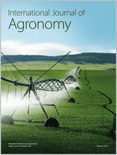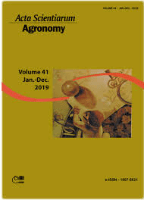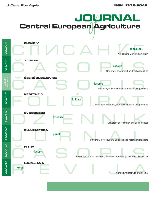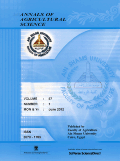
International Journal of Agronomy
Scope & Guideline
Advancing Agricultural Innovation for a Sustainable Future
Introduction
Aims and Scopes
- Crop Production and Management:
Research addressing the improvement of crop yields through various agronomic practices, including fertilization, irrigation, and pest management. - Soil Fertility and Management:
Studies on soil health, nutrient management, and the use of organic and inorganic amendments to enhance soil fertility and productivity. - Plant Breeding and Genetics:
Investigations into genetic variability, breeding techniques, and the development of new crop varieties for improved yield and resilience. - Sustainable Agricultural Practices:
Research promoting sustainable agricultural methods that enhance productivity while minimizing environmental impact, including conservation agriculture and integrated pest management. - Climate Change and Agriculture:
Studies examining the effects of climate change on agricultural systems and exploring adaptive strategies for resilience in crop production. - Biological Control and Integrated Pest Management:
Research focused on biological control mechanisms and integrated approaches for managing pests and diseases in crops.
Trending and Emerging
- Climate-Smart Agriculture:
There is an increasing focus on climate-smart agricultural practices that enhance resilience to climate change while improving productivity. - Biotechnology in Crop Improvement:
Emerging research on biotechnological applications, including CRISPR and other genetic engineering methods, is gaining traction in crop improvement. - Soil Health and Microbiome Research:
An upsurge in studies investigating soil microbiomes and their role in plant health and productivity indicates a growing interest in understanding soil ecosystems. - Agroecological Approaches:
Research exploring agroecological principles and practices is trending, highlighting the importance of biodiversity and ecosystem services in sustainable agriculture. - Integrated Crop-Livestock Systems:
There is a rising interest in integrated crop-livestock systems as a means to enhance resource use efficiency and sustainability. - Nutritional Quality of Crops:
Growing attention is being paid to the nutritional quality of crops, reflecting a broader concern for food security and health.
Declining or Waning
- Traditional Agricultural Practices:
There has been a noticeable decline in research focused solely on traditional agricultural methods, as the journal increasingly emphasizes innovative and sustainable practices. - Single Crop Focus Studies:
Research centered on single crop systems is becoming less frequent, with a shift towards studies that examine intercropping and diversified farming systems. - Chemical Fertilizer Dependency:
The reliance on chemical fertilizers is being overshadowed by a growing interest in organic amendments and sustainable nutrient management practices. - Conventional Pest Control Methods:
There is a waning interest in studies that solely focus on conventional chemical pest control, as integrated pest management and biological control approaches gain traction.
Similar Journals

CROP SCIENCE
Fostering breakthroughs in crop production and genetics.CROP SCIENCE, published by WILEY, is a premier journal dedicated to the field of agronomy and crop science, offering a platform for high-quality research on crop production, genetics, and sustainable agricultural practices. With an impactful presence since its inception in 1974, the journal has become a significant contributor to advancing knowledge in this critical field, as evidenced by its Q2 ranking in the 2023 categorizations and a Scopus rank in the 72nd percentile among its peers. The journal's aim is to disseminate innovative research findings that inform best practices and policies for enhancing crop yield and sustainability, making it an essential resource for researchers, professionals, and students alike. Although CROP SCIENCE does not currently offer open access options, the journal’s extensive readership and reputation make it a valuable asset for anyone invested in the future of agriculture.

Revista de Agricultura Neotropical
Bridging Research and Practice in Neotropical FarmingRevista de Agricultura Neotropical, published by UNIV ESTADUAL MATO GROSSO SUL, serves as a pivotal platform for disseminating research in the fields of agronomy and crop science. Since its inception as an open-access journal in 2014, it has been dedicated to promoting innovative research and practical applications within the agricultural sector, specifically tailored to the challenges and dynamics of the tropical agriculture landscape in Brazil and beyond. Although currently positioned in the Q4 quartile of Scopus rankings, and with a modest agricultural science percentile, the journal actively encourages contributions that highlight sustainable agricultural practices, tropical crop management, and emerging technologies in farming. With its commitment to open access, the Revista de Agricultura Neotropical broadens the reach of critical knowledge, making it accessible to researchers, professionals, and students alike, thus fostering a collaborative environment for advancing agri-scientific initiatives.

REVISTA DE LA FACULTAD DE CIENCIAS AGRARIAS
Exploring the Frontiers of Agronomy and Plant Science.REVISTA DE LA FACULTAD DE CIENCIAS AGRARIAS is an esteemed academic journal published by UNIV NACIONAL CUYO, FAC CIENCIAS AGRARIAS, located in Chacras de Coria, Mendoza, Argentina. As a pivotal publication in the fields of Agronomy and Plant Science, it has achieved a commendable Q2 ranking in both categories, indicating its relevance and impact within the scientific community. Since its establishment as an Open Access journal in 2007, it has facilitated the dissemination of crucial research, fostering collaboration and innovation among researchers, professionals, and students alike. The journal's converged years from 2008 to 2024 allow it to present contemporary advancements and discussions related to agricultural practices and plant sciences. With a strong commitment to quality and accessibility, REVISTA DE LA FACULTAD DE CIENCIAS AGRARIAS provides a valuable platform for those engaged in the crucial exploration of sustainable agricultural methodologies and plant innovations.

ACTA SCIENTIARUM-AGRONOMY
Shaping the future of agronomy with impactful research.ACTA SCIENTIARUM-AGRONOMY is a prestigious, peer-reviewed journal published by UNIV ESTADUAL MARINGA, PRO-REITORIA PESQUISA POS-GRADUACAO, focusing on advanced research in the field of agronomy and crop science. Since its inception as an Open Access journal in 2007, it has significantly contributed to disseminating high-quality research, allowing unrestricted access to its content for a global audience. Operating from Brazil, the journal holds a notable Q2 category ranking in Agronomy and Crop Science as of 2023, validating its importance within the academic community. The journal’s Scopus ranking positions it in the 49th percentile among Agricultural and Biological Sciences, indicating a robust foundation for impactful research. With a commitment to innovation and scientific excellence, ACTA SCIENTIARUM-AGRONOMY aims to provide researchers, professionals, and students with vital insights that drive forward our understanding of agriculture and its environmental implications.

International Journal of Plant Production
Innovating solutions for sustainable plant production systems.International Journal of Plant Production, published by SPRINGER in Switzerland, serves as a leading platform for the dissemination of innovative research in the fields of Agronomy, Crop Science, and Plant Science. With an ISSN of 1735-6814 and an E-ISSN of 1735-8043, this journal has maintained its reputation by achieving a Q2 quartile ranking in both categories as of 2023, alongside notable Scopus rankings placing it in the top quartiles of its fields (Rank #105/516 and Rank #88/406, respectively). The journal's scope encompasses a wide array of topics vital to sustainable agriculture and plant production systems, making it a critical resource for researchers, professionals, and students striving for advancements in these disciplines. By fostering open scientific dialogue and supporting cutting-edge research, the International Journal of Plant Production is committed to contributing to the resolution of global food security challenges, enhancing agricultural practices, and promoting ecological sustainability.

Journal of Central European Agriculture
Sharing Critical Research for a Thriving Agricultural CommunityThe Journal of Central European Agriculture, with ISSN 1332-9049 and E-ISSN 1332-9049, is an esteemed platform published by UNIV ZAGREB, FAC AGRICULTURE that caters to the dynamic fields of agronomy, crop science, and animal science. Since its establishment in 2000, this Open Access journal has played a crucial role in disseminating critical research findings while fostering collaboration among academics, researchers, and professionals within the agricultural community. The journal, which is based in the heart of Croatia, spans a rich history of scholarship, with its content available for free to readers and contributors alike. As reflected in its current standings, the journal has achieved a Quartile 3 ranking in Agronomy and Crop Science and Quartile 4 in Animal Science and Zoology for the year 2023, indicating its growing influence within these disciplines. With Scopus ranks placing it in the 32nd percentile among its peers, the Journal of Central European Agriculture is committed to advancing agricultural sciences not only in Central Europe but globally as it prepares for its converged years from 2007 through 2024. This journal serves as a vital resource for innovative research, practical applications, and a deeper understanding of agricultural challenges and solutions.

ANNALS OF AGRICULTURAL SCIENCES
Advancing Agricultural Knowledge for a Sustainable FutureANNALS OF AGRICULTURAL SCIENCES, published by Elsevier, stands as a leading open access journal dedicated to the multifaceted field of agricultural sciences. Since its inception in 2011, this journal has served as a pivotal platform for the dissemination of high-quality research, covering areas such as agronomy, animal science, horticulture, food science, plant science, and soil science. With an impressive Q1 ranking across multiple disciplines and notable positions in Scopus Ranks—including #6 in Animal Science and Zoology and #3 in Horticulture—this journal is recognized globally for its significant contribution to advancing agricultural innovations. The journal caters to a diverse audience of researchers, professionals, and students, providing them with open access to cutting-edge studies that address critical issues in agricultural productivity and sustainability. Its commitment to high-impact research ensures that articles contribute meaningfully to the scientific community, fostering advancements in agricultural practices and policies.

Agricultural Science and Practice
Fostering collaboration for a resilient agricultural landscape.Agricultural Science and Practice is a pivotal journal dedicated to advancing knowledge and research in the field of agricultural sciences. Published by the NATIONAL ACADEMY OF AGRARIAN SCIENCES OF UKRAINE, this journal serves as a vital resource for researchers, professionals, and students engaged in agriculture, agronomy, and related disciplines. The journal aims to disseminate high-quality, peer-reviewed articles that address contemporary issues, innovative practices, and advancements in agricultural methodologies. While currently specified as non-open access, the journal endeavors to contribute significantly to the global agricultural knowledge pool while fostering a collaborative research environment. With its base in Kyiv, Ukraine, Agricultural Science and Practice plays an essential role in highlighting regional agricultural challenges and solutions, thereby attracting a diverse readership that aspires to enhance food security and sustainable farming practices worldwide.

Frontiers in Agronomy
Unveiling Insights for Global Agricultural ProgressFrontiers in Agronomy, published by FRONTIERS MEDIA SA, is a premier open-access journal dedicated to the dynamic field of agronomy. Launched in 2019, it has rapidly established itself as a leader in the publication of groundbreaking research, holding a distinguished Q1 ranking in several categories including Agricultural and Biological Sciences, Agronomy and Crop Science, Plant Science, and Soil Science as of 2023. With an impressive Scopus ranking that positions it among the top journals in its field, this journal provides a valuable platform for researchers, professionals, and students alike to disseminate and access innovative research and critical insights in agronomy. Every contribution to Frontiers in Agronomy undergoes rigorous peer review, ensuring that high-quality research remains at its core. Accessible to all since its inception, it serves as a vital resource for advancing knowledge and fostering collaboration within the global agronomic community, supporting the quest for sustainable agricultural practices and enhanced crop productivity.

BRAGANTIA
Empowering Innovation in Agriculture and BiologyBRAGANTIA, published by the Instituto Agronômico, is a distinguished open access journal that has been a vital resource since its inception in 1977. With an ISSN of 0006-8705 and E-ISSN 1678-4499, this journal is recognized for its contributions to the field of Agricultural and Biological Sciences, where it currently holds a respectable Q2 ranking as of 2023. Additionally, BRAGANTIA is indexed in various databases, supporting its impact within Materials Science (Q3 ranking). Positioned in Brazil, the journal promotes the dissemination of high-quality research, aiming to bridge the gap between academia and practical applications in agricultural innovation and sustainability. Researchers, professionals, and students looking to keep abreast of recent advancements and their implications will find BRAGANTIA to be an indispensable platform for sharing and accessing vital agricultural knowledge.